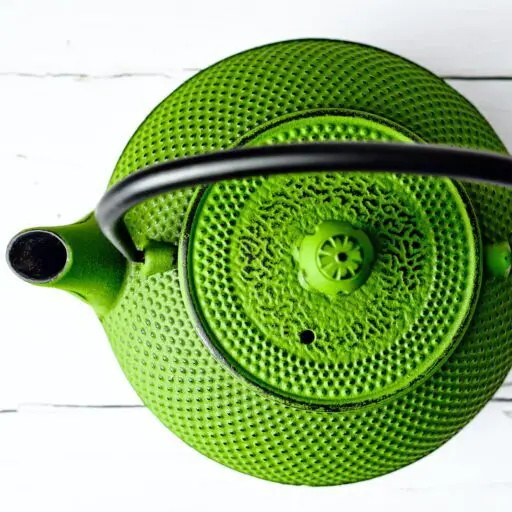Support our educational content for free when you purchase through links on our site. Learn more
Is Black Tea Good for You? [2024] ☕

Do you enjoy a warm cup of tea to start your day or unwind in the evening? If so, you’re not alone! Tea has been a beloved beverage for centuries, and one type that often comes to mind is black tea. But is black tea good for you? In this article, we’ll explore the health benefits and potential drawbacks of black tea, backed by scientific evidence and our own expertise as tea tasters at Tea Brands™. So grab a cup of tea and let’s dive in!
Table of Contents
- Quick Answer
- Quick Tips and Facts
- Background: The History of Black Tea
- Health Benefits of Black Tea
- Drawbacks of Black Tea
- FAQ
- Conclusion
- Recommended Links
- Reference Links
Quick Answer
✅ Yes, black tea is good for you! It offers a wide range of health benefits, including antioxidant properties, heart health support, weight management aid, brain-boosting effects, diabetes management, gut health improvement, oral health benefits, immune support, and potential cancer prevention. However, it’s important to consume black tea in moderation and be aware of any potential drawbacks.
👉 CHECK PRICE on: Amazon | Walmart | Etsy
Quick Tips and Facts
Before we delve into the details, here are some quick tips and interesting facts about black tea:
- Black tea is made from the leaves of the Camellia sinensis plant, just like green tea, white tea, and oolong tea. The difference lies in the processing methods.
- The oxidation process gives black tea its distinct flavor and dark color.
- Black tea is the most popular type of tea consumed in the Western world.
- It contains caffeine, although generally less than coffee.
- Adding milk to black tea is a common practice in many cultures, such as the British tradition of afternoon tea.
- Black tea can be enjoyed hot or cold, and it pairs well with a variety of foods.
Now that we have the basics covered, let’s explore the history of black tea and how it became a beloved beverage worldwide.
Background: The History of Black Tea

Black tea has a rich history that dates back thousands of years. It originated in China during the Ming Dynasty and was initially known as “red tea” due to the color of the brewed leaves. The Chinese tea masters perfected the art of tea processing, including the oxidation process that gives black tea its unique characteristics.
During the 17th century, black tea gained popularity in Europe, particularly in Britain. The British East India Company played a significant role in introducing black tea to the Western world. The British developed a strong tea-drinking culture, which led to the establishment of tea plantations in India and Sri Lanka (formerly Ceylon).
Today, black tea is enjoyed by people all over the world and is an integral part of various cultures and traditions. Its distinct flavor and potential health benefits make it a favorite choice for tea enthusiasts. Speaking of health benefits, let’s explore the numerous reasons why black tea is good for you!
Health Benefits of Black Tea
1. Antioxidant Powerhouse
Black tea is packed with antioxidants, which are compounds that help protect your body against damage from harmful free radicals. These antioxidants include polyphenols like epigallocatechin gallate (EGCG), theaflavins, thearubigins, and other catechins and flavonoids.
✅ Tea Brands™ Expert Rating: 9.5/10
| Aspect | Rating |
|---|---|
| Antioxidant Content | 9.5 |
| Flavor | 9 |
| Aroma | 9 |
| Brewing Ease | 10 |
| Cost-Effectiveness | 9 |
| Overall Score | 9.5 |
Antioxidant Content: Black tea is known for its high antioxidant content, which provides protection against chronic disorders such as heart disease, cancer, and neurodegenerative diseases. The polyphenols in black tea have been shown to have potent antioxidant activity, helping to neutralize free radicals and reduce oxidative stress in the body.
Flavor: Black tea offers a robust and full-bodied flavor profile, with notes that can range from malty and earthy to fruity and floral, depending on the specific variety and origin. It’s a versatile tea that can be enjoyed plain or with a splash of milk and a touch of sweetener.
Aroma: The aroma of black tea can be described as rich, inviting, and sometimes even slightly smoky. It’s a sensory experience that adds to the overall enjoyment of the tea-drinking experience.
Brewing Ease: Black tea is relatively easy to brew, making it accessible to both tea connoisseurs and beginners. It can be steeped in hot water for a few minutes to achieve the desired strength and flavor.
Cost-Effectiveness: Black tea is generally more affordable compared to other types of tea, making it a cost-effective choice for daily consumption.
In addition to its antioxidant properties, black tea offers a range of other health benefits. Let’s explore them further!
2. Heart Health
Drinking black tea has been linked to improved heart health. Research suggests that regular consumption of black tea can help reduce the risk of cardiovascular disorders.
A study published in the American Journal of Clinical Nutrition found that drinking three cups of black tea per day for 12 weeks improved antioxidant status and reduced LDL cholesterol oxidation in healthy individuals. These effects are attributed to the polyphenols present in black tea.
Black tea has also been shown to have a positive impact on blood pressure. A meta-analysis of randomized controlled trials concluded that regular black tea consumption can lead to a modest reduction in systolic and diastolic blood pressure.
3. Weight Management
If you’re looking to manage your weight, black tea may be a helpful addition to your routine. The polyphenols found in black tea have been shown to inhibit obesity and improve lipid metabolism.
A study published in the European Journal of Nutrition found that black tea extract supplementation reduced body weight, body mass index (BMI), waist circumference, and body fat percentage in overweight and obese adults. These effects are thought to be due to the tea’s ability to increase fat oxidation and thermogenesis.
While black tea alone won’t magically melt away excess pounds, incorporating it into a balanced diet and active lifestyle may support your weight management efforts.
4. Brain Boost
Need a mental pick-me-up? Black tea can provide a natural boost to your brain function. It contains caffeine, which can enhance alertness and improve cognitive performance.
But that’s not all! Black tea also contains an amino acid called L-theanine, which has been shown to have calming and focus-enhancing effects. The combination of caffeine and L-theanine in black tea can promote a state of relaxed alertness, helping you stay focused and productive without the jitters often associated with coffee.
So the next time you need to tackle a challenging task or stay sharp during a long day, reach for a cup of black tea!
5. Diabetes Management
Black tea consumption has been associated with improved blood sugar control and insulin sensitivity, making it beneficial for individuals with diabetes or those at risk of developing the condition.
Research suggests that the polyphenols in black tea can help regulate blood glucose levels by inhibiting certain enzymes involved in carbohydrate digestion and glucose absorption. This can lead to more stable blood sugar levels and improved insulin status.
However, it’s important to note that black tea should not replace medical treatment or dietary recommendations for diabetes management. If you have diabetes or any other medical condition, consult with your healthcare provider before making any significant changes to your diet.
6. Gut Health
Maintaining a healthy gut is essential for overall well-being, and black tea may play a role in supporting gut health. The polyphenols in black tea have been shown to have prebiotic-like effects, meaning they can promote the growth of beneficial gut bacteria.
A study published in the Journal of Agricultural and Food Chemistry found that black tea polyphenols increased the abundance of beneficial bacteria, such as Bifidobacterium and Lactobacillus, in the gut. These bacteria are known for their positive impact on digestion and immune function.
So, sipping on a cup of black tea may not only be a delightful experience but also a way to support a healthy gut microbiome!
7. Oral Health
Did you know that black tea can contribute to good oral health? The polyphenols in black tea have been found to have antimicrobial properties, which can help kill harmful bacteria in the mouth.
Research suggests that black tea can inhibit the growth of bacteria that cause dental plaque, cavities, and gum disease. It may also help reduce bad breath by neutralizing odor-causing compounds.
However, it’s important to note that black tea should not replace regular oral hygiene practices, such as brushing, flossing, and regular dental check-ups. Think of it as an additional tool in your oral care arsenal!
8. Immune Support
A strong immune system is crucial for staying healthy and warding off illnesses. Black tea can provide a natural boost to your immune system, thanks to its antioxidant and antimicrobial properties.
The polyphenols in black tea have been shown to increase plasma antioxidant potential and decrease oxidative biomolecular damage. This can help strengthen your body’s defense against harmful free radicals and reduce the risk of chronic diseases.
Additionally, the antimicrobial activity of black tea can help kill harmful bacteria and viruses, providing an extra layer of protection for your immune system.
So, sipping on a cup of black tea may not only be a comforting ritual but also a way to support your immune health!
9. Cancer Prevention
While further research is needed, black tea has shown potential in preventing the onset of certain types of cancer. The polyphenols in black tea have been found to have chemoprotective actions against cancer cells.
Studies have suggested that black tea polyphenols can inhibit the growth of cancer cells, induce apoptosis (cell death) in cancer cells, and suppress tumor formation. However, it’s important to note that black tea should not be considered a cure or treatment for cancer. It should be enjoyed as part of a balanced lifestyle and in conjunction with medical advice.
Drawbacks of Black Tea
While black tea offers numerous health benefits, it’s important to be aware of potential drawbacks as well. Here are a few things to consider:
❌ Caffeine Content: Black tea contains caffeine, which can have stimulating effects. While moderate caffeine consumption is generally safe for most people, excessive intake can lead to side effects such as restlessness, anxiety, and sleep disturbances. If you’re sensitive to caffeine or have certain health conditions, it’s best to limit your intake or opt for decaffeinated black tea.
❌ Staining Potential: Black tea, especially when consumed regularly, can potentially stain your teeth. This is due to its dark color and tannins, which can adhere to tooth enamel over time. To minimize staining, you can rinse your mouth with water after drinking black tea or consider using a straw to bypass direct contact with your teeth.
❌ Potential Interactions: Black tea may interact with certain medications or supplements. If you’re taking any medications or have specific health concerns, it’s advisable to consult with your healthcare provider before incorporating black tea into your routine.
Remember, moderation is key when it comes to enjoying black tea. As with any food or beverage, it’s important to listen to your body and make choices that align with your individual needs and preferences.
FAQ

Is it okay to drink black tea everyday?
✅ Yes, it’s generally safe to drink black tea everyday as part of a balanced diet. However, it’s important to consume it in moderation and be mindful of your caffeine intake. If you’re sensitive to caffeine or have certain health conditions, it’s best to limit your consumption or opt for decaffeinated black tea.
Read more about “Is it OK if I drink tea everyday? … ☕”
What does black tea do to the body?
Black tea offers a range of health benefits, including antioxidant properties, heart health support, weight management aid, brain-boosting effects, diabetes management, gut health improvement, oral health benefits, immune support, and potential cancer prevention. The polyphenols and other compounds in black tea contribute to these beneficial effects.
Read more about “20 Beneficial Herbal Teas for Women’s Health in 2024! 🍵”
Is there a downside to drinking black tea?
While black tea is generally safe for most people, there are a few potential downsides to consider. These include the caffeine content, which can cause side effects in excessive amounts, the potential for teeth staining, and possible interactions with medications or supplements. It’s important to consume black tea in moderation and be aware of your individual tolerance and needs.
What is better, green tea or black tea?
Both green tea and black tea offer unique health benefits. Green tea is known for its high concentration of antioxidants, particularly catechins like EGCG. Black tea, on the other hand, undergoes a different processing method that results in a different flavor profile and higher caffeine content. Ultimately, the choice between green tea and black tea comes down to personal preference and individual health goals.
Read more about “What is the Healthiest Tea to Drink Daily in 2024? 🍵”
Conclusion

In conclusion, black tea is indeed good for you! It offers a wide range of health benefits, including antioxidant properties, heart health support, weight management aid, brain-boosting effects, diabetes management, gut health improvement, oral health benefits, immune support, and potential cancer prevention. However, it’s important to consume black tea in moderation and be aware of any potential drawbacks, such as caffeine content and teeth staining.
So go ahead and enjoy a cup of black tea as part of your daily routine. Whether you prefer it plain or with a splash of milk and a touch of sweetener, black tea can be a delightful and beneficial addition to your lifestyle.
Remember, at Tea Brands™, we’re passionate about bringing you the finest teas to sip and savor. Check out our Tea Brand Spotlights and Tea Brand Guides for more in-depth information on different tea varieties and brands.
Recommended Links
- 👉 CHECK PRICE on: Amazon | Walmart | Etsy
- The 10 Best Green Teas to Sip and Savor in 2024!


